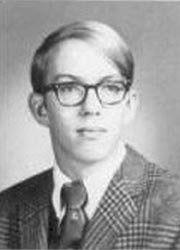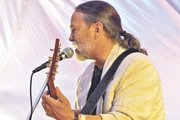Award-winning blues musician and Fort Hunt native Scott Ainslie travels back to Alexandria this weekend to perform songs from his new album Thunder’s Mouth. The 55-year-old Vermont-based artist has not played a local concert in close to a decade. This performance is particularly meaningful as it will bring Ainslie back to the place where his passion for blues first blossomed and important life-long relationships were forged.
Scott Ainslie is a true "bluesman" in every sense of the word. He not only plays and writes blues, but is an avid collector and historian of the genre as well as a dedicated instructor. In fact, though Ainslie spends about 170 days a year touring, he’s managed to record 5 albums, write a well-received book about blues legend Robert Johnson’s collected works and teach thousands through workshops and residential fellowships across the country.
"It’s a service," says Ainslie to describe what he does. Helping an audience understand the roots and significance of each song he plays is an important part of Ainslie’s work.
AINSLIE DISCOVERED THE BLUES in 1967, after seeing John Jackson, a local musician and gravedigger, play a few songs during a Mike Seeger concert at Groveton High School.
"It was the first time I heard non-commercial music in my life," said Ainslie. "I was completely floored."
Jackson became one of the most influential forces in the young artist’s career. Ainslie went on to study and perform with him, forming a close bond that would continue until Jackson’s death in 2002, three days after the pair were scheduled to appear onstage together.
Trish Byerly worked as Jackson’s manager for 14 years. She first met Ainslie in 1986 when he toured with Jackson.
"What stands out in my mind with Scott is the love and reverence between friends," said Byerly of his relationship with Jackson. "They just loved and adored each other."
Though Byerly’s contact with Ainslie was primarily through Jackson, she describes a very personal connection to him as a performer.
"I’ve thought a lot about what makes a musician great," said Byerly. "And I’ve realized the greatest musicians are simply the greatest people. I felt that with Scott. He has warmth, respect for people, respect for culture."
Over the years, Ainslie formed relationships with other musicians. He recalls talking late into the night with older artists and closely watching their fingers float over the guitar strings to absorb as much as possible.
According to Ainslie, these connections allowed him to "internalize a tradition I wasn’t born into, but grew up around."
Ainslie was profoundly affected by the role music played in the activism of the 1960s, particularly the civil rights movement. For him, "art exists to challenge us and make us think . . . to rebalance our self-awareness." Towards this effort, Ainslie often incorporates history into his performances through storytelling, and integrates traditional with contemporary tunes.
It is especially important to the musician that his songs help his listeners and pupils "recognize the role African Americans have played in creating the society we live in today, from our language and music to our food." Thunder’s Mouth, which was released this summer, is based on slave narratives and stories from Tennessee.
Ainslie is also a populist when it comes to his music. His experience working in, and later serving on the state board of the North Carolina Visiting Artist Program taught him to "play for all audiences, from pre-schoolers to senior citizens." The musician lists this experience as a formative period in his career, stating that it showed him the kind of impact music instruction can have when it is made readily accessible.
THOUGH AINSLIE’S MUSIC has taken him far from Northern Virginia – he’s lived in Europe, New York City, North Carolina and now New England – the personal ties developed during his youth in Alexandria continue to shape his life. Ainslie married his high school sweetheart, Barb Ackemann – though it happened in 2003, more than three decades after they initially courted. The couple met through the Mount Vernon Presbyterian Church youth group (Ainslie also sang in the church’s choir) and dated for two years. They stayed in touch after parting ways in 1970 and rekindled their romance eight years ago, after both suffered painful losses.
Ainslie also maintains a strong friendship with fellow Fort Hunt High School graduate and musician Al Petteway. (Fort Hunt High School is now Carl Sandburg Middle School on Fort Hunt Road.) He remembers vividly the last encounter he had with Ainslie in high school when the two performed at a coffee house in a church basement.
"I just remember being impressed by this long blond-haired kid walking in with a banjo tucked under his arm," recalled Petteway, who, like so many other teenage boys, was playing strictly rock ‘n roll music at the time.
Although the two were only acquaintances in school, they became close 30 years later when Petteway found Ainslie online and invited him to teach at his yearly guitar camp in Asheville, N.C.
"Scott brings out the best in his students," said Petteway. "He helps a lot of people bring what’s inside out."

